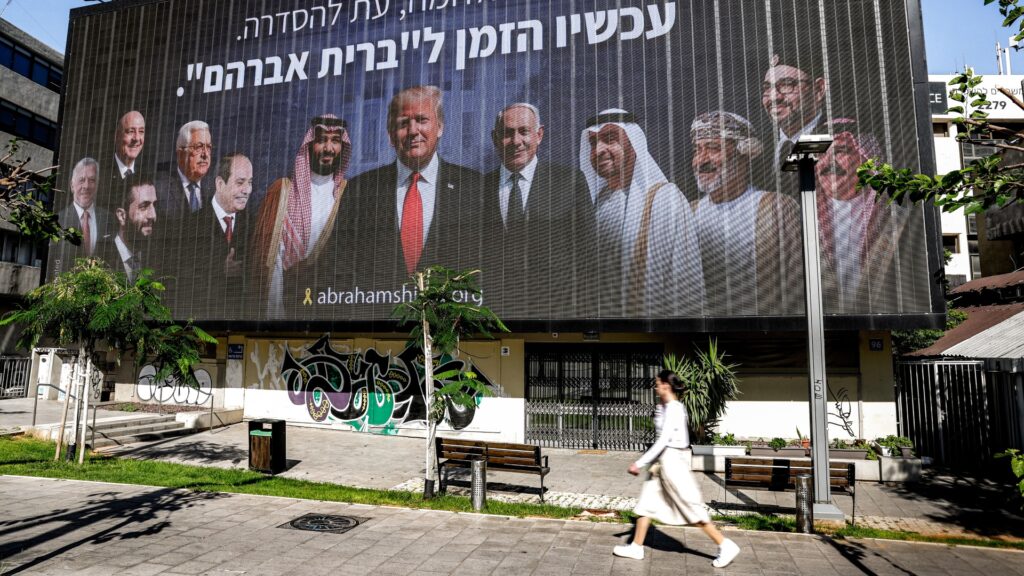Syrians fear the country could plunge back into the throes of war if its new rulers press ahead with a normalisation deal with Israel.
Last week, Israeli Foreign Minister Gideon Saar told journalists that his government was seeking more normalisation agreements in the region, with Syria and Lebanon eyed as among the countries looking to formally establish diplomatic relations despite the ongoing war on Gaza.
“Israel is interested in expanding the Abraham Accords circle of peace and normalisation,” Saar said of the US-brokered deals that Israel signed with the United Arab Emirates, Bahrain, Morocco and Sudan in 2020, during US President Donald Trump’s first term in office.
“We have an interest in adding countries such as Syria and Lebanon, our neighbours – to the circle of peace and normalisation while safeguarding Israel’s essential and security interests,” Saar added.
His comments came days after Israeli Prime Minister Benjamin Netanyahu said that Israel’s recent conflict with Iran had opened “the path to dramatically enlarge the peace accord”.
New MEE newsletter: Jerusalem Dispatch
Sign up to get the latest insights and analysis on
Israel-Palestine, alongside Turkey Unpacked and other MEE newsletters
Alaa Ibrahim al-Hajji, an IT engineer, lamented the Israeli ministers’ comments and warned that “any move toward normalisation will spark widespread public anger that could undermine the government’s legitimacy”.
“I don’t want Syria to be dragged into another war after all the destruction we’ve endured,” he said.
‘Public reaction would be overwhelmingly negative, especially with what’s happening in Gaza’
– Hassan Nifi, Syrian writer
Syria was mired in a brutal civil for more than 13 years until rebels, led by the powerful Hay’at Tahrir al-Sham group, launched a lightning offensive in December – capturing Damascus, Aleppo and other key areas.
Immediately after the fall of the Assad dynasty, Israel began seizing more Syrian territory near the occupied Golan Heights, claiming it was concerned about President Ahmed al-Sharaa’s interim administration, which it has dismissed as “jihadist”.
Since assuming power, Sharaa has admitted that his government is holding “indirect talks” with Israel, and on Tuesday, Syrian sources told the Israeli newspaper Yedioth Ahronoth that the Syrian president had met with Israel’s national security adviser Tzachi Hanegbi in Abu Dhabi. The Israeli prime minister’s office later denied the meeting.
Israel and Syria have technically been at war since the first Arab-Israeli war in 1948. A state of heightened tension and deep enmity between the two countries accelerated during the 1967 war, which also drew in Egypt and Jordan, and Israel’s subsequent occupation of the Syrian Golan Heights.
Meaningful talks
Hajji decried the Syrian government’s approach towards Israel and said it would be unacceptable for any Syrian to accept a normalisation deal as Gaza continues to be attacked.
“Syrians can’t ignore Israel’s crimes against children and innocent civilians,” he said.
For more than 21 months, Israel has relentlessly bombed the besieged Gaza Strip, displacing the entire 2.3 million population multiple times and killed more than 57,000 Palestinians, mostly civilians.

Syria’s new rulers face unprecedented criticism as Israel uses air space to attack Iran
Read More »
The figure also includes at least 1,400 health sector professionals, 280 UN aid workers – the highest staff death toll in UN history – and at least 228 journalists, with the highest number of media workers killed in conflict since the Committee to Protect Journalists (CPJ) began recording data in 1992.
In recent days, Tom Barrack, one of US President Donald Trump’s key envoys to the Middle East, has said Syria and Israel are engaged in “meaningful” talks through the US that aim to restore calm along their border.
Meanwhile, reports in Israeli media have suggested that Trump is dangling the possibility of a normalisation agreement between Israel and Syria as a carrot in exchange for Israel agreeing to end the war in Gaza.
Hassan Nifi, a Syrian writer, told MEE that Sharaa would struggle to get popular approval for a normalisation deal, but if he miraculously went ahead with it, it would push the country to the brink.
“Public reaction would be overwhelmingly negative, especially with what’s happening in Gaza,” he said.
“Everyone knows this [normalisation] deal would be entirely in Israel’s favour.”
Too early to talk about normalisation
Israeli leaders have repeatedly lobbied the US to keep Syria weak and decentralised, and earlier this year, Finance Minister Bezalel Smotrich vowed that the war on Gaza would only end when Palestinians were forcibly displaced and Syria was dismembered.
Israel has also attempted to exploit the plight of the Druze minority, and has repeatedly attacked sites in Syria it claims are being used “act” against the interests of the minority religious group.
“Israel’s real goal is to dismantle Syria’s military infrastructure so it can’t defend itself,” Nifi said.

Syria-Israel talks: Why the Golan Heights must not be a bargaining chip
Read More »
“More importantly, Israel wants to exploit Syria’s fragile security and economic collapse to extract political concessions, chief among them normalisation.”
However, Wael Alwan, a researcher at the Jusoor Center for Studies, said that it was still too early to talk about normalisation between the former foes.
“There are still deep-rooted issues between the two sides,” he said, adding: “Israel maintains a hardline stance toward Syria’s new government, continues to occupy large parts of southern Syria, and wants to keep intervening militarily to serve its own goals – all of which undermine Syria’s sovereignty.”
He noted that unless Israel came to the negotiating table and there was a broader Arab consensus on normalisation – one that requires resolving the Palestinian issue and securing regional security guarantees from Israel – it was unlikely Syria would formally recognise Israel anytime soon.
Saudi Arabia’s crown prince and de-facto ruler, Mohammed bin Salman, has repeatedly said the kingdom would not normalise relations unless there is a clear pathway to a Palestinian state.

